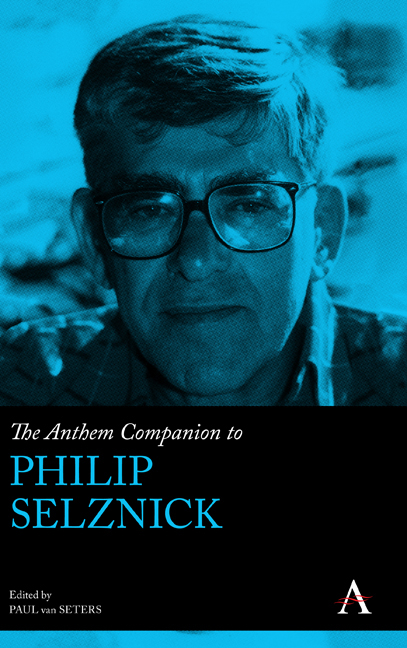Book contents
- Frontmatter
- Contents
- List of Contributors
- Chapter 1 The Intellectual Enterprise We Call Sociology
- Chapter 2 Philosophy for the Twice-Born: Selznick and Dewey in Dialogue
- Chapter 3 Power Relations across Organizations and Fields: Building on Selznick’s Concepts of Co-Optation and Institutionalization
- Chapter 4 Organizations, Institutions, and Law: The Sociological Significance of Philip Selznick’s Law, Society, and Industrial Justice
- Chapter 5 Post-Industrial Justice? Normativity and Empiricism in a Changing World of Work
- Chapter 6 The Promise of the Rule of Law Ideal
- Chapter 7 Philip Selznick on Law and Society: Democratic Ideals, Communitarianism, and Natural Law
- Chapter 8 Selznick’s Concepts of Culture and Community
- Chapter 9 A Symposium on The Moral Commonwealth
- Chapter 10 An Ecumenical Sensibility
- Index
Chapter 8 - Selznick’s Concepts of Culture and Community
Published online by Cambridge University Press: 19 October 2021
- Frontmatter
- Contents
- List of Contributors
- Chapter 1 The Intellectual Enterprise We Call Sociology
- Chapter 2 Philosophy for the Twice-Born: Selznick and Dewey in Dialogue
- Chapter 3 Power Relations across Organizations and Fields: Building on Selznick’s Concepts of Co-Optation and Institutionalization
- Chapter 4 Organizations, Institutions, and Law: The Sociological Significance of Philip Selznick’s Law, Society, and Industrial Justice
- Chapter 5 Post-Industrial Justice? Normativity and Empiricism in a Changing World of Work
- Chapter 6 The Promise of the Rule of Law Ideal
- Chapter 7 Philip Selznick on Law and Society: Democratic Ideals, Communitarianism, and Natural Law
- Chapter 8 Selznick’s Concepts of Culture and Community
- Chapter 9 A Symposium on The Moral Commonwealth
- Chapter 10 An Ecumenical Sensibility
- Index
Summary
Introduction
As has often been noted, Philip Selznick's rich corpus of scholarly writing shows remarkable long-run continuities of concern over the course of its development, despite the widely varying subject matter that he addressed successively, especially in his books. The aim of this chapter is to explore and assess Selznick's concepts of culture and community. These concepts assume prominence in different ways and at different stages in his work, but it will be argued here that they are intimately related and ultimately mutually supportive. Consequently, neither can be fully understood and productively analyzed without the other. However, the concept of culture emerges explicitly in Selznick's thinking long before that of community. Culture as an idea is presented early as a focus in his work, in his second book (Selznick 1952), although initially in an oblique way, mainly through a sociological portrayal of the elements of social life that are likely to remain if culture is more or less absent from it. By contrast, the concept of community is presented in fully developed form only in the final stages of Selznick's career; above all, in his great summation of his intellectual outlook in The Moral Commonwealth (1992) and in the short work The Communitarian Persuasion (2002) that followed it.
As regards community, this chapter is not directly concerned to evaluate the normative commitments to communitarianism in Selznick's late work, but only to examine the analytic utility of his concept of community. He recognized the closeness, in some important respects, of Emile Durkheim's thinking to his own sociological outlook, primarily in the sense that both Selznick (1992, xii, 141) and Durkheim saw sociology as preeminently a “moral science,” that is, an empirical inquiry about the moral structures and underpinnings of social life. So, in evaluating Selznick's ideas, some comparisons can usefully be made with a Durkheimian approach to community. Such an approach, it will be suggested, is very close to Selznick's in some ways; in others sharply and instructively opposed.
- Type
- Chapter
- Information
- The Anthem Companion to Philip Selznick , pp. 149 - 168Publisher: Anthem PressPrint publication year: 2021



